The Hill’s Morning Report – Presented by Facebook – Small businesses, unemployed await Congress’s next moves

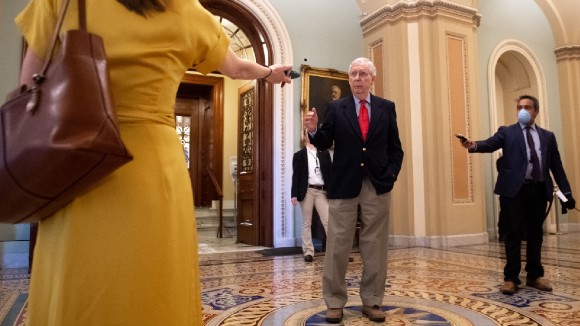
Welcome to The Hill’s Morning Report. It’s Friday, the end of another rough week around the country. We get you up to speed on the most important developments in politics and policy, plus trends to watch. Alexis Simendinger and Al Weaver are the daily co-creators, so find us @asimendinger and @alweaver22 on Twitter and recommend the Morning Report to your friends. CLICK HERE to subscribe!
Total U.S. coronavirus deaths reported each morning this week: Monday, 9,648; Tuesday, 10,993; Wednesday, 12,911; Thursday, 14,808; Friday, 16,686.
In five days, and heading into what is expected to be a grim weekend, the coronavirus claimed more than 7,000 lives in the United States.
At a time when the U.S. economy showed new signs on Thursday of being in free fall and the Trump administration pleaded with Congress to approve another quarter of a trillion dollars to bolster lending for small businesses, Democratic lawmakers said they would not act without adding new ingredients to the next phase of relief.
Senate Democrats blocked an attempt by Senate Majority Leader Mitch McConnell (R-Ky.) to pass an additional $250 billion for the Paycheck Protection Program, which provides loans and grants to small businesses with fewer than 500 employees. The administration pushed for the funding increase in recent days, but the unanimous consent request was blocked by Sens. Ben Cardin (D-Md.) and Chris Van Hollen (D-Md.), who labeled the move a “political stunt.”
“The majority leader knew full well that there was not agreement and consensus,” Van Hollen said, saying the GOP proposal as drafted was “designed to fail.”
Shortly after, Senate Democrats attempted to pass their own legislation that included the funding McConnell tried to pass, along with an additional $100 billion for hospitals, $150 billion for state and local governments and an expansion of food assistance. McConnell blocked that, sending the two sides back to the drawing board and delaying anything from passing until Monday at the earliest.
McConnell indicated discussions would continue but did not specifically say if he would try again on Monday to pass the funding increase (The Hill). Will the Senate be in session next week? One top GOP senator says it’s unlikely (The Hill).
As Alexander Bolton writes, the standoff throws the next stage of coronavirus relief negotiations up in the air. Senate Democrats are negotiating with Treasury Secretary Steven Mnuchin in hopes of reaching a deal that would include funding for hospitals and state governments.
Senate Minority Leader Charles Schumer (D-N.Y.) has told colleagues he’s optimistic about reaching a deal with Mnuchin, who is also negotiating with Cardin, the ranking Democrat on the Small Business Committee, and Sen. Ron Wyden (Ore.), the ranking Democrat on the Finance Committee, who were central to working out a deal last month on the coronavirus relief package.
“I’ve talked to Schumer about a dozen times in the last 12 hours and I think he is optimistic that we can reach some degree of comity,” Cardin said.
The Hill: Pelosi digs in on next coronavirus bill: “We have made our statement.”
The Hill: Sen. Kamala Harris (D-Calif.), Rep. Alexandria Ocasio-Cortez (D-N.Y.) and other Democrats are calling for recurring direct payments as part of a fourth coronavirus bill.
In the states, the frustration with Congress was evident. “We need the federal government to pass legislation that helps,” New York Gov. Andrew Cuomo (D) said on Thursday. “This is not the time for politics. This is the time to pass legislation that actually addresses the need.” Cuomo said he spoke with Sens. Schumer and Kirsten Gillibrand (D-N.Y.) and expressed his ire that New York was told by lawmakers and the administration that the state would receive $6 billion in the coronavirus relief law, and instead learned it will receive $1.3 billion while also learning that one-third of New York’s Medicaid recipients would not be helped.
More Congress news: Rep. Neal Dunn (R-Fla.), a physician, has tested positive for COVID-19 (WCTV).
President Trump urged Congress to keep negotiating while continuing on Thursday to predict that America’s economic downturn will eventually become “a big bounce” of recovery.
“We’re going to open up strong and I think we will open up very successfully,” he told reporters. He did not attach a timetable to his optimistic forecast. “I think we’re going to do well.”
The National Association of Economists sees things differently, according to its survey of forecasters. The consensus is for U.S. unemployment above 6 percent for the next 24 months and a brutal second quarter this year (Reuters).
Anthony Fauci, director of the Institute for Allergy and Infectious Diseases, cautioned that restarting America’s economy after months of stay-at-home orders will be gradual, in stages regionally, and must be accompanied by a steep decline in the rates of COVID-19 infections, hospitalizations and fatalities. That drop-off will allow officials to focus on containment of new cases and the contact tracing and testing that goes along with control over new community spread, rather than revisiting lockdowns and draconian isolations.
“It’s not going to be one-size fits all,” Fauci said.
The Hill: The Trump administration is laying the foundation to reopen parts of the U.S. economy as early as May, when current federal guidelines to battle the coronavirus expire.
The Washington Post: The administration is aiming to reopen much of the United States next month, raising concerns among public health experts about new coronavirus infections. Trump regularly looks at unemployment and stock market numbers, complaining they are hurting his presidency and reelection prospects, according to outside advisers.
The administration has “a number of working groups looking at how do we reopen the country and how do we stay open,” Vice President Pence added. To restart before there’s a vaccine and while the coronavirus is still a threat will require an end to major contagions in the current hot spots; the availability of effective therapeutics to help patients who are infected; guidance from the Centers for Disease Control and Prevention about precautions and restrictions people must heed while resuming work, school and travel; and mass testing for COVID-19 within the U.S. population, Pence said.
White House national economic adviser Larry Kudlow says the president does not have in mind a formal advisory group to help him revive the economy, but is consulting with various administration officials, businesses and friends. “There’s no formal structure,” he told reporters on Thursday.
Reuters: The White House is expected to announce an economic coronavirus task force, according to a senior administration official.
The U.S. economic picture darkened on Thursday with Labor Department news that close to 17 million people have filed for unemployment benefits in the last month, amounting to the worst downturn for workers since the Great Depression (The Hill). At the same time, the Federal Reserve on Thursday stepped in with the details of its much awaited Main Street lending program worth $2.3 trillion (CNBC).
The Washington Post: America is in a depression. The challenge now is to make it short-lived.
The New York Times: Too small and too late, the effort by the United States to halt economic damage cannot keep up.
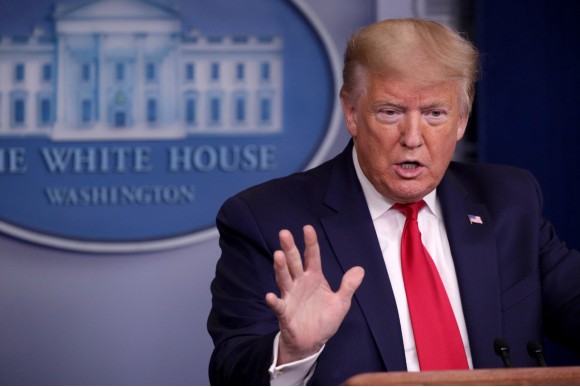
$100M grant program for small businesses impacted by COVID-19
Know a small business in need of extra support right now?
We are offering $100 million to provide businesses with resources they need during COVID-19.
LEADING THE DAY
U.S. CORONAVIRUS UPDATE: Welcome news: Total U.S. deaths from the coronavirus by early summer may wind up closer to 60,000 than 100,000, as projected at the White House on March 31. Fauci urged Americans for the time being to continue to stay at home.
“We’ve got to continue to redouble our efforts at the mitigation of physical separation in order to keep those numbers down and hopefully even get them lower than what you’ve heard recently,” Fauci said on Thursday during an interview on CBS “This Morning.”
A University of Washington model, often cited by U.S. and state officials, now estimates based on regular recalculations using the latest data that COVID-19 will kill 60,415 Americans by Aug. 4 — with the peak likely this weekend, when the model projects 2,212 people across the United States will die (Reuters).
As scientists learn more about the coronavirus, U.S. public health data shows that COVID-19 is infecting more women than men, but men are more likely to be seriously ill and die (The Hill). Scientists aren’t sure why there is a marked gender difference, but theories include behavioral differences, the comparative strength of women’s immune systems, and the effects of testosterone in the process of immune reactions to the deadly virus. The higher rate of infections and deaths among men also appeared in data from China and Italy (The New York Times).
Deborah Birx, immunologist and coordinator with the president’s coronavirus task force, said on Thursday that the latest data indicates that around the nation, 56 percent of patients being tested for coronavirus were women and 16 percent were positive for COVID-19, while 44 percent of the patients with symptoms who were tested were male, and 23 percent tested positive.
Governors are trying every idea they can think of to recruit experienced health care workers to staff harried hospitals during the crisis, yet many foreign-born health workers in the United States have an extra worry: ensuring their immigration paperwork remains current. Missed deadlines could mean they lose their jobs and coveted approval to remain in the United States. More than 3 million of the country’s 18 million health care and social workers are foreign born, according to a report by the Migration Policy Institute (The Hill).
> New York: Hospitalizations have ebbed slightly in the Empire State, according to statistics shared on Thursday, but the death toll, considered a lagging indicator during any disease pandemic, continued to rise. New cases entering hospitals numbered 200, but fatalities rose to a record high of 799 on Wednesday. More than 7,000 people have died in New York from COVID-19 (Reuters).
> New Jersey: The Garden State is seeing some small signs that the rate of infection from the coronavirus is slowing, Gov. Phil Murphy (D) said on Thursday — although he stressed that confirmed cases and deaths are still rising and the peak number of hospitalizations is expected to hit within days (NJ.com). … The National Guard arrived to provide assistance at a New Jersey Veterans Home on Thursday in which 40 veterans have contracted COVID-19 and 10 have died. Twenty-four other veterans, an unusually high number, have died since the outbreak began, documents show, and a source said four others died on Wednesday. “It’s horrible, horrible,” said Mitchell Haber of Wyckoff, N.J., whose father is a resident. “They’re all sick. They’ve lost almost half their patients at this point” (NorthJersey.com).
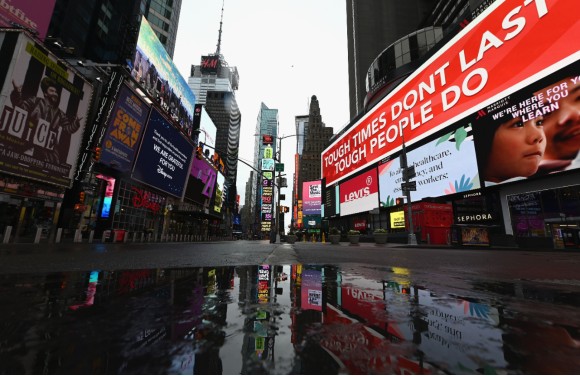
> Michigan: Gov. Gretchen Whitmer (D), a rising star in her party, said her state is not yet seeing the kind of plateauing in new cases of the coronavirus that has been cited in other states and in disease models used by the White House. Michigan has the third highest confirmed number of COVID-19 cases in the nation and Whitmer said the stay-at-home order through April 30 and instructions in Michigan for strict social distancing are more important than ever right now (The Washington Post).
> Virginia: One governor in America is a physician. Gov. Ralph Northam (D), a pediatric neurologist, is putting his medical knowledge to use during the coronavirus pandemic. He says he tries to treat the public as he would a patient: “People want the truth.” (The Associated Press).
> Louisiana: The New York Times “The Daily” podcast interviewed a New Orleans nurse who is a veteran of caring for Ebola patients in Africa. Yanti Turang has been caring for coronavirus patients since early March and described the personal protective equipment shortages in her hospital and the risks that such scarcities create. With her newly acquired COVID-19 experience comes a cold-eyed skill in assessing new patients, she says. “The first thing I think, if you’ve got the symptoms, are you going to live or are you going to die?” she said.
On Thursday, Louisiana public health officials reported to the White House that 40 percent of coronavirus patients on ventilators in the state are now coming off mechanical breathing and surviving the disease, considered a significant improvement, Birx said. (Some major hospitals in New York City report that approximately 20 percent of their coronavirus patients survive intubation and ventilation.)
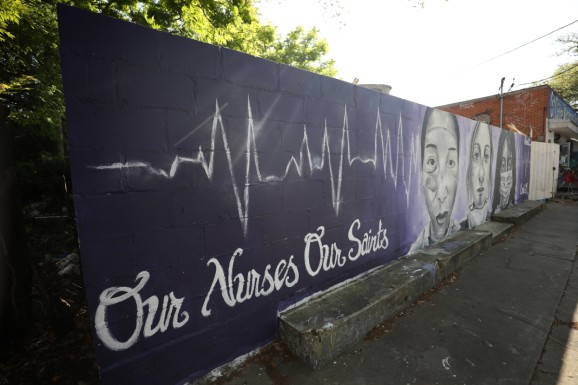
IN FOCUS/SHARP TAKES
CORONAVIRUS & INTERNATIONAL: Italian Prime Minister Giuseppe Conte is expected to extend the national lockdown for two additional weeks beyond April 13 as the country faced increases in reported cases and deaths.
The potential decision from Conte will likely come as leaders determine what businesses could potentially reopen next week. According to officials, those would include selected companies in the food and pharmaceutical sectors, along with some shops. Conte could approve a new decree on the issue as early as today.
“Faced with an epidemic of this proportion, I’d tend to trust the viral experts,” Deputy Finance Minister Antonio Misiani said on Thursday. “The sooner we get the health situation under control, the sooner we can get the economic engine started again” (Bloomberg News).
Italy reported 4,204 new confirmed cases of COVID-19 and 610 new deaths on Thursday — both upticks from a day earlier. On Wednesday, Italy’s Civil Protection Agency announced 3,836 new cases and 542 deaths. According to the latest statistics, the death toll sits at 18,279 and there are 143,626 cases of the virus.
Time: An Italian doctor who is flattening the curve by treating COVID-19 patients in their homes.
Reuters: European Union nears deal on coronavirus package as Germany puts its foot down.
> Spain: Spanish Prime Minister Pedro Sanchez said Thursday that the national lockdown will likely carry on until May, but indicated that recent data showed Spain was close to the start of a decline in the pandemic.
The comments came as the parliament extended the Spanish state of emergency until April 26, with Sanchez indicating that he will likely have to ask parliament for another 15-day extension to the lockdown in two weeks.
The daily death toll decreased to 683 people on Thursday, bringing the total to more than 15,000, while total cases increased by 5,756. Spain now has the third highest death toll after being overtaken by the U.S. As of this morning, Spain has 153,222 confirmed cases.
“The velocity of the increase of the virus is decreasing throughout Spain,” said Maria Jose Sierra, deputy head of the health emergencies (Reuters).
Reuters: France more than doubles crisis package cost to 100 billion euros.
> China: Chinese officials announced new guidelines on Wednesday as they look to combat COVID-19 through targeting asymptomatic carriers in an attempt to avoid a second wave of the virus spreading across the country.
Under the new measures, medical institutions must report any asymptomatic case within two hours of its detection, with local governments having to inform all known close contacts of the carrier within 24 hours. Asymptomatic individuals would be quarantined for 14 days collectively, while those with close contact of the carrier would also be quarantined.
Additionally, Beijing announced that tables at bars in the capital city must be more than three feet apart (Reuters).
> OPEC +: Talks among global energy ministers resume today, including representatives from Saudi Arabia and Russia, seeking an agreement that would lower oil production worldwide as prices continue plummeting and supplies surge during the coronavirus pandemic. Trump, who has said U.S. output was already falling due to low prices, warned Riyadh it could face sanctions and tariffs on its oil if it did not cut enough to help the U.S. oil industry (Reuters).
> United Kingdom: British Prime Minister Boris Johnson was taken out of the intensive care unit but remains in a London hospital as he continues his recovery from the novel coronavirus.
After testing positive for the virus on March 27, Johnson has been at St. Thomas’ Hospital since Sunday and was moved to the intensive care unit on Monday, having spent three nights in the ICU.
According to Downing Street, Johnson “has been moved this evening from intensive care back to the ward, where he will receive close monitoring during the early phase of his recovery.”
“He is in extremely good spirits,” a Downing Street spokesman added. Shortly after the news emerged, Trump tweeted a note of support for Johnson, an ally of the president (BBC).
“Great News: Prime Minister Boris Johnson has just been moved out of Intensive Care. Get well Boris!!!” Trump said.
Reuters: Ireland set to lift lockdown step-by-step when virus restrictions ease.
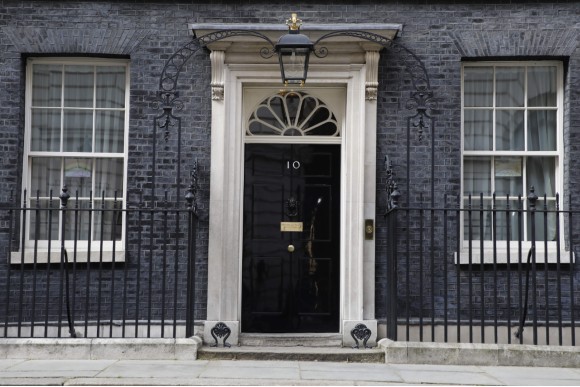
***
POLITICS: With the Democratic primary in the rearview mirror, former Vice President Joe Biden faces a formidable task in the coming weeks and months as he looks to unify the progressive and moderate wings of the party after Sen. Bernie Sanders (I-Vt.) dropped his bid for the nomination on Wednesday.
Biden extended an olive branch in the direction of Sanders’s supporters on Thursday as he unveiled proposals to lower the Medicare eligibility age to 60 and an expansion of student debt forgiveness programs for low-income and middle-class families (The New York Times).
However, more is likely needed to be done as Sanders is not expected to go quietly into the night, as Julia Manchester and Max Greenwood report. The Vermont Independent has pledged to keep his name on the ballot in the remaining primaries to amass enough delegates to inflict pressure on the Democratic establishment to adopt progressive ideas, like “Medicare for All.” Adding to the problems is the ongoing pandemic, which has digitized everything, limiting Biden’s ability to bring the two sides together.
“There’s no doubt about it that the pandemic and this distancing certainly impacts where he gets a lot of his energy, which is the retail politicking, the connecting with one-on-one voters in rope lines at events and at town halls and such,” said Moe Vela, a Democratic strategist and White House adviser in the Clinton and Obama administrations.
Appearing on MSNBC on Thursday night, Sanders lauded the two policy announcements by Biden’s campaign, calling them steps “in the right direction.”also
“And I think what you have begun to see and will continue to see is that the vice president is listening to many of the concerns that low income people and working people and young people have and beginning to move in their direction,” Sanders told host Chris Hayes.
“I think what you will see is the vice president beginning to move in a more progressive direction,” he said referencing the policy shifts.
The Wall Street Journal: Why Michigan signaled the end for Bernie Sanders’s campaign: “Nothing more we could do.”
Ryan Lizza, Politico: Barack Obama wins the Democratic primary.
The Associated Press: Biden’s next big decision: Choosing a running mate.
The pandemic hasn’t stopped outreach from key progressive sectors. As Rachel Frazin writes, environmental groups are pushing the former vice president to take on a more aggressive platform on climate change.
The issue continues to grow as a significant issue within the Democratic Party. Progressives like Sanders who continue to push for far-left policies, including a fracking ban, while moderates have not gone as far. Although some advocates have said they will now support Biden, others were more reticent, hoping he will take on some of Sanders’s positions on the issues.
“We’re not going to sugarcoat it: our hearts are heavy,” Sunrise Movement spokesperson Aracely Jimenez said in a statement. “The ball’s now in Joe Biden’s court. To avoid a repeat of 2016, he needs to show young people that he’s going to stand up for them by embracing policies like an ambitious Green New Deal that led young voters to flock to Bernie. If he doesn’t do this, our work turning out our generation to defeat Trump this fall becomes a lot harder.”
The Morning Report is created by journalists Alexis Simendinger and Al Weaver. We want to hear from you! Email: asimendinger@digital-stage.thehill.com and aweaver@digital-stage.thehill.com. We invite you to share The Hill’s reporting and newsletters, and encourage others to SUBSCRIBE!
OPINION
A Holy Week amid a national tribulation, by Peggy Noonan, columnist, The Wall Street Journal. https://on.wsj.com/2yQmzlZ
Poor state reporting hampers the pandemic fight, by Steven Goodman and Nigam Shah, opinion contributors, The Hill. https://bit.ly/2RmHDH2
Where is Trump’s missing War Powers report? by Scott R. Anderson, opinion contributor, Defense One. https://bit.ly/2yO3EZ0
Keeping people safe and informed about COVID-19
Stay safe and informed during the COVID-19 crisis with the latest information from trusted health authorities like the CDC.
Visit Facebook’s new Coronavirus (COVID-19) Information Center for more.
WHERE AND WHEN
The House will hold a pro forma session at 9 a.m.
The Senate will convene in a pro forma session on Monday at 10 a.m.
The president participates in an Easter blessing in the Oval Office at noon with Bishop Harry Jackson.
Pence will lead a coronavirus task force meeting at the White House on Good Friday. The administration’s daily COVID-19 briefing is scheduled for 1 p.m.
Economic indicators: The Bureau of Labor Statistics will release reports at 8:30 a.m. on the Consumer Price Index for March and real earnings for March, in snapshots looking backwards during an economic downturn.
The Coronavirus Report, helmed by The Hill’s Editor-at-Large Steve Clemons, has updates and exclusive video interviews with policymakers emailed each day. Sign up HERE!
Hill.TV’s “Rising” program features news and interviews at http://digital-stage.thehill.com/hilltv or on YouTube at 10:30 a.m. ET at Rising on YouTube.
ELSEWHERE
➔ U.S. Navy: The trip this week to Guam by former Navy Acting Secretary Thomas Modly to address the crew of the USS Theodore Roosevelt may have cost taxpayers $243,000. His leaked remarks to sailors, captured on audio, in which he castigated former Capt. Brett Crozier as “stupid” for raising an alarm about a coronavirus outbreak on the aircraft carrier, contributed to Modly’s resignation this week (CNBC).
➔ Inspectors general: Sen. Chris Murphy (D-Conn.) and Rep. Jim Cooper (D-Tenn.) on Thursday introduced legislation that would protect inspectors general, the quasi-independent watchdogs inside executive departments and agencies, from politically motivated firings and set their terms at seven years (NBC News). … In the last week, Trump fired, removed or publicly berated inspectors general across multiple federal agencies, including the oversight official who was tasked by law last week with overseeing the massive $2.2 trillion coronavirus stimulus package. Some Republicans say they are unsure if the president’s purge, which is based on his belief that IGs are disloyal to him and part of the “deep state,” has ended (The Hill).
➔ Travel: Believe it or not, more people are booking cruise travel for 2021 than in 2019 (The Los Angeles Times).
➔ Weekend viewing: Italian tenor Andrea Bocelli will sing to a Milan cathedral bare of worshippers on Easter Sunday, hoping to bring together people isolated during the coronavirus lockdown in a live streamed broadcast he said would not be a concert but a prayer. Bocelli will be accompanied only by the cathedral organist, Emanuele Vianelli, playing one of world’s largest pipe organs and performing a repertoire of sacred works including Pietro Mascagni’s Sancta Maria. To watch, check out Bocelli’s YouTube channel on Sunday at 1 p.m. ET (Reuters).
➔ Sports: Today, former St. Louis Cardinals first baseman Mark Hamilton, 35, the son of a doctor, will graduate from the Donald and Barbara Zucker School of Medicine at Hofstra/Northwell in New York. The now-online ceremony was moved up a month in response to the coronavirus pandemic and Hamilton, now an M.D. who is specializing in interventional radiology, says he’s ready to help patients during the coronavirus emergency in New York City, the epicenter of the virus in the United States (The Associated Press).

THE CLOSER
And finally … Congratulations to readers who played the Morning Report Quiz about Sen. Bernie Sanders (I-Vt.), who exited the 2020 Democratic presidential primary on Thursday.
Here’s who felt the Bern and knew some quick trivia about the Vermont Independent: Patrick Kavanagh, Daniel Bachhuber, Kate Lohman, RJ Agostinelli, Walter Pflaumer, Luther Berg, Randall S. Patrick, David Bond, Donna Minter, William Chittam, John Donato and Mike Roberts.
They knew that Sanders carried 23 states and territories over Hillary Clinton in the 2016 Democratic primary race.
Sanders announced his challenge to Clinton and other Democrats who sought the party’s nomination last time during a low-key April 2015 press conference outside the U.S. Capitol, attended by Capitol Hill reporters.
During a debate last summer in Detroit, Sanders told Rep. Tim Ryan (D-Ohio), “I wrote the damn bill!” as he ramped up his public ownership of “Medicare for All.”
And Larry David, creator of “Seinfeld” and “Curb Your Enthusiasm,” portrayed Sanders to much acclaim and laughter on “Saturday Night Live.”
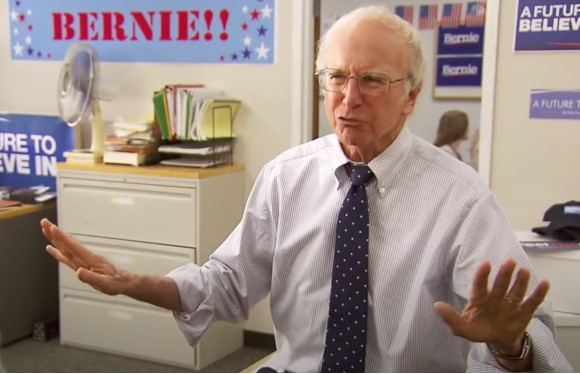
Copyright 2023 Nexstar Media Inc. All rights reserved. This material may not be published, broadcast, rewritten, or redistributed. Regular the hill posts









